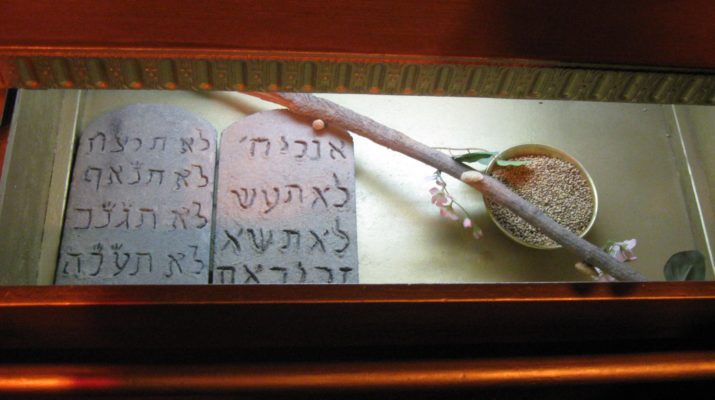Numbers 17
BibleHub
1 The LordA spokeB to Moses,C saying,
Notes on verse 1
A “Lord” = YHVH. From havah (to be, become) or hayah (to come to pass, become, be). This is the name of the God of Israel, the self-existent and eternal one, the tetragrammaton. This pronunciation has been lost to time so “Lord” is generally used in its place.
B “spoke” = dabar. This is generally to speak, answer, declare, or command. It might mean to arrange and so to speak in a figurative sense as arranging words.
C “Moses” = Mosheh. From mashah (to pull out in a literal or figurative sense, to draw out) OR from Egyptian mes or mesu (child, son i.e. child of…). This is Moses – the one drawn out from the water, which is to say, rescued. If derived from the Egyptian, his name would share a root with Rameses and Thutmose.
2 “Speak to the Israelites,D and getE twelveF staffsG from them,
Notes on verse 2a
D “Israelites” = ben + Yisrael. Literally, “children of Israel.” Ben is from banah (to build or obtain children). This is son, age, child. It is son in a literal or figurative sense. Yisrael is from sarah (to persist, exert oneself, contend, persevere, wrestle, prevail) + el (God or god). This is Israel, meaning God strives or one who strives with God; new name for Jacob and for his offspring. This refers to the people and to the land.
E “get” = laqach. This is to take, accept, carry away, receive. It can also have the sense of take a wife or take in marriage.
F “twelve” = shenayim + asar. Shenayim is from sheni (double, again, another, second); from shanah (to fold, repeat, double, alter, or disguise). This is two, both, second, couple. Asar is related to eser (ten). This is -teen or -teenth.
G “staffs” = matteh. From natah (to stretch or spread out, extend, bend). This is a staff, rod, branch, or tribe. It could be a rod for discipline or correction. It could be a scepter to indicate authority, a throwing lance, or a walking staff. Figuratively, it could also be something that supports life (like bread).
oneH for each ancestralI house,J from allK the leadersL of their ancestral houses.
Notes on verse 2b
H “one” = matteh. Same as “staffs” in v2. See note G above.
I “ancestral” = ab. This is father, chief, or ancestor. It is father in a literal or figurative sense.
J “house” = bayit. Related to “Israelites” in v2. Probably from banah (see note D above). This is house, court, family, palace, temple.
K “all” = kol. From kalal (to complete). This is all or every.
L “leaders” = nasi. From nasa (to lift in a broad sense, literally and figuratively; to carry, take, or arise; to bring forth, advance, accept). This is one lifted up or exalter. So, it could be prince, chief, ruler, captain, king, or vapor.
WriteM each man’sN nameO on his staff,
Notes on verse 2c
M “write” = kathab. This is to inscribe, write, record, or decree.
N “man’s” = ish. Perhaps from enosh (human, humankind, mortal); from anash (to be weak, sick, or frail). This is man, husband, another, or humankind.
O “name” = shem. May be from sum (to put, place, set). This is name, fame, renown. A name was thought to indicate something essential about a person – something about their individuality. So, this word can also mean honor, authority, or character.
3 and write Aaron’sP name on the staff of Levi.Q For there shall be oneR staff for the headS of each ancestral house.
Notes on verse 3
P “Aaron’s” = Aharon. Derivation uncertain. May mean “bearer of martyrs” OR be related to Ancient Egyptian ꜥḥꜣ rw (warrior lion) OR elevated, exalted, high mountain. This is Aaron. See https://en.wiktionary.org/wiki/Aaron
Q “Levi” = Levi. Perhaps from lavah (to join, twine, unite, remain, borrow, lend). This is Levi, perhaps meaning “attached.” It can refer to Jacob’s son, his tribe, and descendants.
R “one” = echad. Perhaps from achad (to unify, continue on a path; figuratively, to gather one’s thoughts). This is the number one, first, united. It can also be alone, altogether, a certain, a few.
S “head” = rosh. This may come a word that means to shake. It is the head, captain, or chief. It can also be excellent or the forefront. It can be first in position or in statue or in time (i.e. the beginning).
4 PlaceT them in the tentU of meetingV
Notes on verse 4a
T “place” = yanach. Perhaps from the same as nuach (to rest, calm, camp, free, place, remain, satisfy, settle, station, or wait; implies settling down in a literal or figurative sense). This is to lay down, let alone, pacify, cast down, or deposit. It can also mean to allow something or someone to stay.
U “tent” = ohel. Perhaps from ahal (to shine, be clear). This is a tent, covering, home, or side pillar.
V “meeting” = moed. From yaad (to appoint, assemble or gather selves, agree). This is a meeting, assembly, fixed time. It can be used for a festival or feast. It can also refer to a meeting place.
beforeW the covenant,X where I meetY with you.
Notes on verse 4b
W “before” = paneh. From panah (to turn, face, appear). This is face in a literal or figurative sense. It could be face, presence, anger, respect. It can also be used of God to indicate divine favor or presence.
X “covenant” = eduth. From ed (witness, testimony, recorder); from ud (to admonish, repeat, duplicate, testify, restore, record, relieve). This is testimony, ordinance, decree, warning, or witness.
Y “meet” = yaad. Related to “meeting” in v4. See note V above.
5 AndZ the staff of the man whom I chooseAA shall sprout;BB
Notes on verse 5a
Z {untranslated} = hayah. Related to “Lord” in v1. See note A above.
AA “choose” = bachar. This is to choose, appoint, try, excellent.
BB “sprout” = parach. This is to sprout, blossom, bloom, spread, flourish.
thus I will put a stopCC to the complaintsDD of the Israelites that they continually makeEE against you.”
Notes on verse 5b
CC “put a stop” = shakak. 5x in OT. This is to decrease, subside, pacify. It can also mean to weave as when one sets a trap. It is also used when the Great Flood subsides in Genesis 8.
DD “complaints” = tlunah. 9x in OT – all in Exodus & Numbers. From lun (to stop – usually to lodge for the night; can imply dwelling, enduring, or staying permanently; figuratively, can mean being obstinate, particularly with one’s words – to complain). This is grumbling or complaining. All occurrences are about the Hebrew people complaining in the wilderness.
EE “make” = lun. Related to “complaints” in v5. See note DD above.
6 Moses spoke to the Israelites, and all their leaders gaveFF him staffs, one for each leader,GG according to their ancestral houses, twelve staffs; and the staff of Aaron was amongHH theirs. 7 So Moses placed the staffs beforeII the Lord in the tent of the covenant.
Notes on verses 6-7
FF “gave” = natan. This is to give, put, set, offer. It is to give literally or figuratively.
GG “one for each leader” = nasi + echad + matteh + nasi + echad. Literally, “a staff for one leader, a staff for one leader.” Nasi is the same as “leaders” in v2. See note L above. Echad is the same as “one” in v3. See note R above. Matteh is the same as “staffs” in v2. See note G above.
HH “among” = tavek. This is among, middle, in the midst, the center. Perhaps, properly, to sever.
II “before” = paneh. Same as “before” in v4. See note W above.
8 WhenJJ Moses wentKK into the tent of the covenant on the next day,LL MMthe staff of Aaron for the house of Levi had sprouted. It put forthNN buds,OO
Notes on verse 8a
JJ {untranslated} = hayah. Same as {untranslated} in v5. See note Z above.
KK “went” = bo. This is to enter, come in, advance, fulfill, bring offerings, enter to worship, attack. It can also have a sexual connotation.
LL “next day” = mochorath. From the same as machar (tomorrow or later; deferred time; indefinitely or the time to come); perhaps from achar (to be behind, delay, be late, procrastinate, continue). This is the next day or next morning.
MM {untranslated} = hinneh. From hen (lo! Behold! If, though; an expression of surprise). This is to draw attention, show suddenness or surprise, or to emphasize the importance of the coming statement. See! Lo! Behold!
NN “put forth” = yatsa. This is to go or come out, bring forth, appear. It is to go out in a literal or figurative sense.
OO “buds” = perach. Related to “sprout” in v5. 17x in OT. From parach (see note BB above). This is a bud or blossom. It can refer to a real one or one artistically rendered.
producedPP blossoms,QQ and boreRR ripe almonds.SS
Notes on verse 8b
PP “produced” = tsuts. 9x in OT. This is to twinkle, shine, blossom. Figuratively, it is to flourish.
QQ “blossoms” = tsiyts. Related to “produced” in v8. 15x in OT. From tsuts (see note PP above). This is a blossom or flower. In the sense of glistening, it could also be a polished plate or the wing of a bird.
RR “bore” = gamal. This is how one deals with someone whether positively or negatively – so to reward, requite. It can also mean to wean or the work that goes into something ripening.
SS “ripe almonds” = shaqed. 4x in OT. From shaqad (to watch, be alert, remain awake). This is an almond tree or the almond nut.
9 Then Moses brought outTT all the staffs from beforeUU the LordVV to all the Israelites, and they looked,WW and each man tookXX his staff.
Notes on verse 9
TT “brought out” = yatsa. Same as “put forth” in v8. See note NN above.
UU “before” = paneh. Same as “before” in v4. See note W above.
VV “Lord” = YHVH. Related to “Lord” in v1 & {untranslated} in v5. See note A above. It has a different vowel pointing, but the same meaning as Lord.
WW “looked” = raah. This is to see in a literal or figurative sense so stare, advise, think, view.
XX “took” = laqach. Same as “get” in v2. See note E above.
10 And the LordYY said to Moses, “Put backZZ the staff of Aaron beforeAAA the covenant, to be keptBBB as a warningCCC
Notes on verse 10a
YY “Lord” = YHVH. Same as “Lord” in v1. See note A above.
ZZ “put back” = shub. To turn back, return, turn away – literally or figuratively. Doesn’t necessarily imply going back to where you started from. This is also the root verb for the Hebrew word for repentance “teshubah.”
AAA “before” = paneh. Same as “before” in v4. See note W above.
BBB “kept” = mishmereth. From mishmar (jail, guard, watch, guard post); from shamar (to keep, watch, or preserve; to guard something or to protect it as a thorny hedge protects something). This is a guard or watch or guard post. It is used figuratively for obligation, duty, or observance, including religious observance.
CCC “warning” = oth. From avah (to mark, sign, point out); OR from uth (to agree). This is a sign in a literal or figurative sense. It could be a flag or monument. It could be evidence or a mark. It could also be an omen or a miracle.
toDDD rebels,EEE so that you may make an endFFF of their complaints against me, or else they will die.”GGG
Notes on verse 10b
DDD {untranslated} = ben. Same as “Israelites” in v2. See note D above.
EEE “rebels” = meri. From marah (to be contentious, rebellious, bitter, provoking, disobedient; to be or make bitter or unpleasant; figuratively, to rebel or resist; causatively to provoke). This is bitter – figuratively rebel or rebellion. It shares a root with Miriam and Mary.
FFF “make an end” = kalah. This is to end, be finished, complete, prepare, consume, spent, or completely destroyed.
GGG “die” = mut. This is to die in a literal or figurative sense. It can also refer to being a dead body.
11 Moses didHHH so; just as the LordIII commandedJJJ him, soKKK he did.
Notes on verse 11
HHH “did” = asah. This is to make, do, act, appoint, become in many senses.
III “Lord” = YHVH. Same as “Lord” in v1. See note A above.
JJJ “commanded” = tsavah. This is to charge, command, order, appoint, or enjoin. This is the root that the Hebrew word for “commandment” comes from (mitsvah).
KKK “so” = ken. Perhaps from kun (properly, in a perpendicular position; literally, to establish, fix, fasten, prepare; figuratively, it is certainty, to be firm, faithfulness, render sure or prosperous). This is to set upright. Generally used figuratively to mean thus, so, afterwards, rightly so.
12 The Israelites said to Moses, “LLLWe are perishing;MMM we are lost;NNN all of us are lost!
Notes on verse 12
LLL {untranslated} = hen. Related to {untranslated} in v8. See note MM above.
MMM “perishing” = gava. This is to breathe out, which implies expire or die.
NNN “are lost” = abad. To wander off, lose self. This implies to perish, destroy, die, vanish, or be broken or corrupt.
13 EveryoneOOO who approachesPPP the tabernacleQQQ of the LordRRR will die. Are we allSSS to perish?”
Notes on verse 13
OOO “everyone” = kol. Same as “all” in v2. See note K above.
PPP “approaches” = qareb. 8x in OT. From qarab (to come near, offer, make ready). This is to come, approach, draw near.
QQQ “tabernacle” = mishkan. From shakan (to settle down in the sense of residing somewhere or staying there permanently; to abide or continue). This is a place where one lives – a tabernacle, tent, or other kind of dwelling. It can also be a lair where animals live, the grave, the Temple, or the Tabernacle.
RRR “Lord” = YHVH. Same as “Lord” in v1. See note A above.
SSS “are…all” = tamam. This is to finish or accomplish. It is to make perfect, demonstrate that you are upright, consume or cease. It is to complete in a literal or figurative sense, positive or negative.
Image credit: “Timna Tabernacle Inside the Ark of the Covenant.” Photo by Ori229, 2009.




